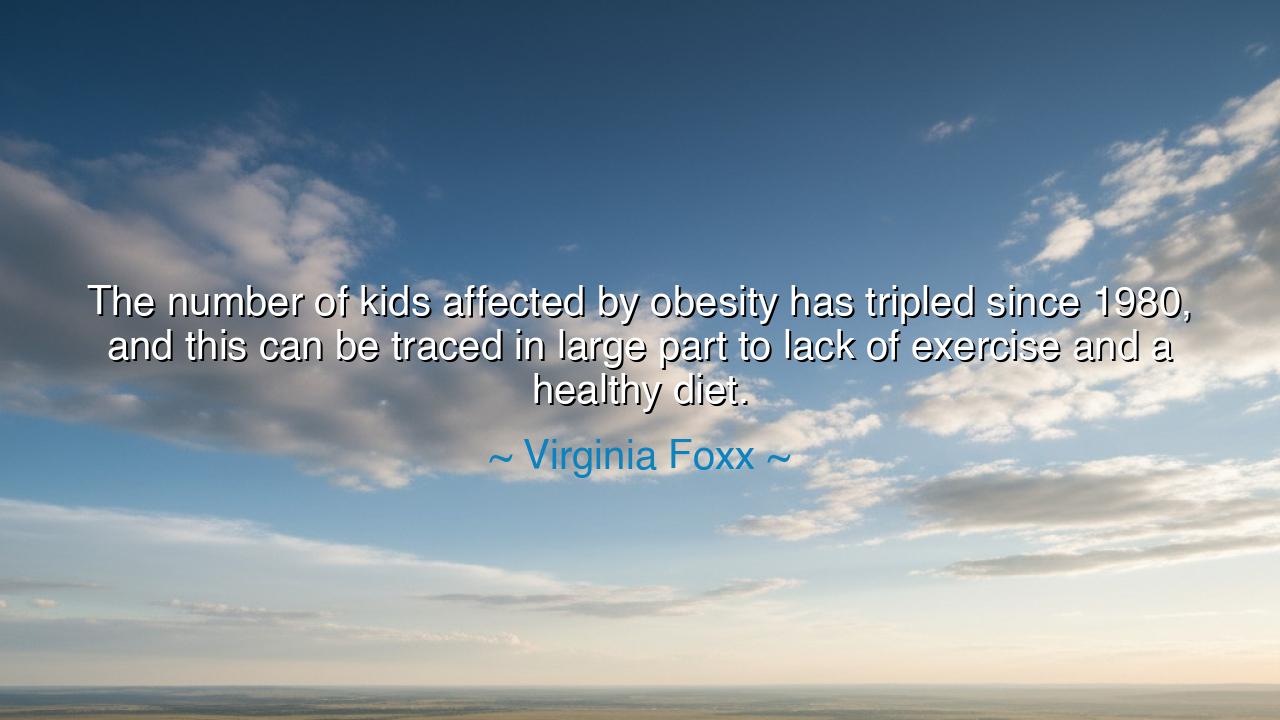
The number of kids affected by obesity has tripled since 1980
The number of kids affected by obesity has tripled since 1980, and this can be traced in large part to lack of exercise and a healthy diet.






"The number of kids affected by obesity has tripled since 1980, and this can be traced in large part to lack of exercise and a healthy diet." These words, spoken by Virginia Foxx, resonate with the wisdom of the ages, for they speak of a profound truth: the health of the next generation is shaped by the choices we make today. The rapid rise of obesity among the youth is a clear reflection of how we, as a society, have abandoned the timeless virtues of physical activity and nourishing food. The consequences of these choices reverberate through the generations, affecting not only the children of today but the future of humanity itself.
In the days of old, great civilizations understood the importance of physical strength and a well-balanced diet. The ancient Greeks, renowned for their wisdom and athleticism, placed great emphasis on the cultivation of the body as well as the mind. Their athletes were revered not just for their victories in the arena, but for their discipline, which demanded a harmonious balance of exercise and nutrition. They knew that the health of the individual was crucial to the health of the whole society, and that without a strong body, the mind would falter, and the spirit would weaken. In this way, the physical prowess of the ancient world was seen as a reflection of a well-rounded life, one that honored both physical and mental excellence.
Yet, as the centuries passed and civilizations rose and fell, the emphasis on health and well-being began to fade. In the modern age, we have seen the slow, insidious rise of obesity, not as a natural consequence of age or illness, but as the result of neglecting the virtues that once defined healthy living. The youth of today, too often, live in an environment that promotes ease and convenience over effort and care. The fruits of their labor are now found in fast food, and their recreation, in front of glowing screens, rather than in the fields or in the open air. As Foxx points out, this shift in habits has led to an alarming rise in obesity—a crisis that has tripled since 1980.
Let us not be mistaken: this is not a simple matter of individual choice, but one that speaks to the very structure of modern society. Technological advancements and urbanization have placed us in environments that are more sedentary, where convenience often trumps health. The human body was never meant to remain idle, yet our world encourages this stillness. Like the ancient warriors, who knew that victory came through both training and discipline, we too must return to a way of life that nurtures both our bodies and our minds. The rise of obesity among children is not just a personal failure—it is a collective one, a failure of society to uphold the values that once guaranteed health and strength.
And yet, within this crisis lies a powerful opportunity for change. We are called to rise above this moment of weakness, to reclaim the wisdom of the past, and to honor the body as a temple of strength. It is not too late. For even in the face of adversity, we possess the power to make choices that will shape the future. Let us look to the ancient traditions for guidance, where communities once flourished by embracing the natural rhythms of life—by rising with the sun, by working the earth, by training the body in the open air, and by nourishing it with foods that came from the land. We must rediscover the sacred balance of food and exercise, and pass it down to future generations.
Take, for example, the story of Hippocrates, the great healer of ancient Greece, who said, "Let food be thy medicine, and let medicine be thy food." This profound statement speaks to the harmony that must exist between what we consume and how we live. Hippocrates understood that health was not a fleeting pursuit, but a way of life—a commitment to the principles of moderation, movement, and nourishment. If we wish to reverse the trend of rising obesity, we must return to this ancient wisdom, to the simple, powerful truths that have guided humanity for millennia.
Thus, the lesson to be learned is clear: our health is not just a personal matter, but one that is intertwined with the health of our society. To break free from the chains of obesity, we must rediscover the value of exercise and nourishing food, and instill these values in the hearts and minds of our children. We must create an environment that encourages movement, that celebrates the virtues of a balanced diet, and that fosters a culture of health for future generations. Virginia Foxx has called upon us to act. Let us answer this call, knowing that the future of our children, and the future of our world, depends on the choices we make today. Let us strive to be the stewards of our own health, and the guardians of a brighter, stronger tomorrow.






AAdministratorAdministrator
Welcome, honored guests. Please leave a comment, we will respond soon